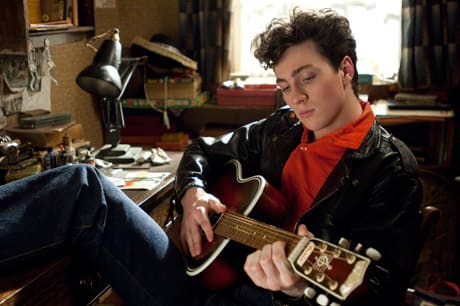Based on the memoirs of John Lennon's half-sister, Nowhere Boy is an ambitious, but flawed, dramatization detailing the formative years of the legendary singer-songwriter. The film succeeds in pinpointing the lifelong angst Lennon suffered from a dysfunctional childhood, but falls short in miscasting some key characters, starting with the teenage Lennon.
Julia Baird's books portray the young Lennon as imaginative, warm and surprisingly middle-class. They also reveal a broken childhood where Lennon's exuberant, but flaky, mother (Julia Sr.) couldn't handle raising a child by herself after her sailor husband disappeared overseas. That was taboo in those days, and children like that usually ended up in an orphanage.
Instead, Julia's stern, but responsible, older sister (Mimi) raises the lad as her own. These two women in Lennon's life - an authoritative yet caring woman versus her free-spirited, but unreliable sister - will inspire the music Lennon will record in coming years ("Run For Your Life," "You're Gonna Lose That Girl," as well as the 1970 Plastic Ono Band album) and draw him to Yoko Ono, who combines both of these mother figures.
If this sounds terribly Freudian then so is Wood's film, which lays bare the sexual undercurrent running between the teenage Lennon and his blood mother when they listen to Screaming Jay Hawkins shout "I Put A Spell On You" in her home. Kristin Scott Thomas shines as the stoic, cold Mimi, while Anne-Marie Duff portrays the perfect foil as bon vivant Julia (unrecognizable from The Last Station).
Nowhere Boy, however, falters in casting newcomer Aaron Johnson as Lennon. He is rarely convincing playing such a complex character. Lennon's angst, insecurity and creative drive feel forced. (Ian Hart nailed it in 1994's Backbeat.) Though the nascent Beatles barely figure in this movie, Thomas Sangster as a teenaged Paul McCartney is another bad casting choice. True, Sangster delivers a good performance, but he's much smaller and younger-looking than Johnson. Their scenes together are confusing.
If casting is 90-percent of a director's job then Wood has only half-succeeded. To be fair, this is her first feature and on the whole it isn't bad. However, she has yet to deliver on the promise of her acclaimed short films.
(Maple)Julia Baird's books portray the young Lennon as imaginative, warm and surprisingly middle-class. They also reveal a broken childhood where Lennon's exuberant, but flaky, mother (Julia Sr.) couldn't handle raising a child by herself after her sailor husband disappeared overseas. That was taboo in those days, and children like that usually ended up in an orphanage.
Instead, Julia's stern, but responsible, older sister (Mimi) raises the lad as her own. These two women in Lennon's life - an authoritative yet caring woman versus her free-spirited, but unreliable sister - will inspire the music Lennon will record in coming years ("Run For Your Life," "You're Gonna Lose That Girl," as well as the 1970 Plastic Ono Band album) and draw him to Yoko Ono, who combines both of these mother figures.
If this sounds terribly Freudian then so is Wood's film, which lays bare the sexual undercurrent running between the teenage Lennon and his blood mother when they listen to Screaming Jay Hawkins shout "I Put A Spell On You" in her home. Kristin Scott Thomas shines as the stoic, cold Mimi, while Anne-Marie Duff portrays the perfect foil as bon vivant Julia (unrecognizable from The Last Station).
Nowhere Boy, however, falters in casting newcomer Aaron Johnson as Lennon. He is rarely convincing playing such a complex character. Lennon's angst, insecurity and creative drive feel forced. (Ian Hart nailed it in 1994's Backbeat.) Though the nascent Beatles barely figure in this movie, Thomas Sangster as a teenaged Paul McCartney is another bad casting choice. True, Sangster delivers a good performance, but he's much smaller and younger-looking than Johnson. Their scenes together are confusing.
If casting is 90-percent of a director's job then Wood has only half-succeeded. To be fair, this is her first feature and on the whole it isn't bad. However, she has yet to deliver on the promise of her acclaimed short films.
